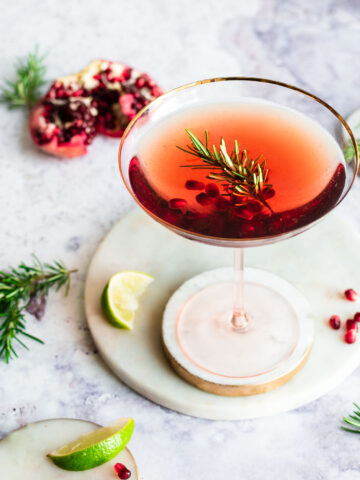Autumn has firmly entrenched itself up here in the Pacific Northwest. Snowcapped the mountains, and the trees that line the highways release glinting flurries of orange and gold leaves every time the wind shakes its way through. It's cold enough now to warrant a fire in the evenings, and sometimes the morning too.
It's this time of year that I keep something warm to drink at the ready: Spiced Butter Tea in the morning, Mulled Wine with friends in the evening, hot cider with the kids.
So, What's Cranberry Mors?
Lately, I've pulled Cranberry Mors into our routine. A traditional Russian drink made by simmering tart berries with honey-sweetened water until they burst, mors tastes mildly tart and sweet.
Though often served cold, I prefer to serve ours infused with sweet spices and warm almost like a hot, mulled cranberry cider.
Tradition and folklore hold that mors, and particularly cranberry mors, helps to buffer the immune system against illnesses like colds and flu and to help digestion when enjoyed before eating. There could be some truth to that as all tart berries are rich in antioxidants and vitamin C.
Why Use Whole Cranberries (and not just juice)
You might wonder about using whole cranberries rather than using only their juice. Here's the trick: when cooked, cranberries release pectin, a plant fiber that gives mors a delightful, almost silky texture; moreover, pectin is positively loaded with benefits of its own.
Researchers have found that pectin helps you to feel full longer (source) and that diets rich in pectin (and other sources of dietary fiber) support heart health and more optimal cholesterol levels (source). You can extract more of the berries' goodness when using the traditional method for making mors by simmering the berries in water, straining them, and sweetening the resulting liquid.







Brianna says
This recipe is amazing! I made for the holidays last year and was worried I wouldn’t be able to find it again-so glad I found it! I’m excited to remake 🙂
Kathy L. says
I really want to make this but I only have ground allspice not allspice berries. Could I use the ground?
Tyla says
How long does it keep for? I love this recipe and made a double batch about 5 days ago.
Jenny says
I'd keep it about one week.
Tara says
Going to try this! How would you incorporate ginger bug with this recipe? I have some ready to use. Thanks.
Jenny says
I would mix 1/4 cup bug with 1 quart of mors, then let it sit in flip-top bottles for 3 days.
Katie Riddle says
This was easy and delicious. We'll be making it frequently this season. Thank you!
Fiona Chain says
Hi Jennifer, this sounds totally delicious and so good for you at the same time! What's not to love. We are just heading into our spring but there still have been some cooler evenings and mornings, I think thus gorgeous drink would be just lovely served cold as well in our hot hot summers.
Fi
Carrie Rose says
So, how about a fermented version?
Lisa says
Dear queen of probiotic goodness--could this be fermented? 🙂 Just a thought....
Bonnie says
If you double the recipe, should you also double all of the spices?
Jenny says
No, I think you should keep spices as is, but might increase them if you triple the recipe.
Cindy Meredith says
This sounds like a wonderful addition to my water kefir!
Joanne says
Due to blood sugar irregularities, I cannot have honey so no cranberry sauce or cranberry jelly for a very long time. Do you think that this recipe could be converted to cranberry jelly using stevia leaves and gelatin? If so, how would I go about doing that? I would be using gelatin powder. How much would I use for these ingredients? This sounds delicious. I'm going to make the beverage using stevia too but hope I could also make the jelly.
Jenny says
Hi Joanne,
I'd just google "Cranberry Sauce with Stevia" and call it good.
Rebecca says
I love cranberries I am definitely giving this recipe a try!! I live in Nevada we are just NOW starting to get our cool weather I am sooo excited for snuggling up and drinking warm drinks with the kiddos!
Jenny says
Hope you love it, Rebecca!
Elizabeth says
Sounds lovely! Would any modifications be needed, apart from the quantity of water, to make it with dried cranberries?
Jenny says
Hi Elizabeth, I don't recommend making this from dried cranberries. They really do need to be fresh or frozen.
Suzanne says
It seems a shame to throw out (or compost) the solids! Any possible use for them?
Jenny says
You could pick out the spices and add the remaining cranberries to a cranberry sauce, or spread them on goat cheese and toast.
Jessica Haller says
It's beautiful Jenny. Thank you.
I don't have star anise. Can i omit it? Or perhaps replace it with something else?
Jenny says
Hi Jessica, you can just omit it. It'll still taste amazing.
Susan says
This sounds like a really nice drink for a chilly evening. I like that it is healthy as well as tasty.
Linda says
This sounds great. I have some Lakeland pure cranberry juice- do you think i could try it with that instead of fresh cranberries?
Jenny says
Hi Linda,
You can add spices to your cranberry juice, for sure, but it's not at all like what this recipe produces. Cranberry mors is delicate, almost perfumed with spice and honey. It's worth it to use whole fruit.